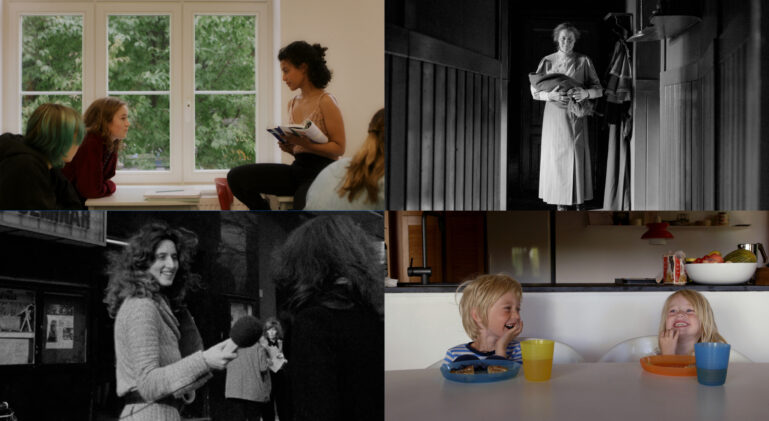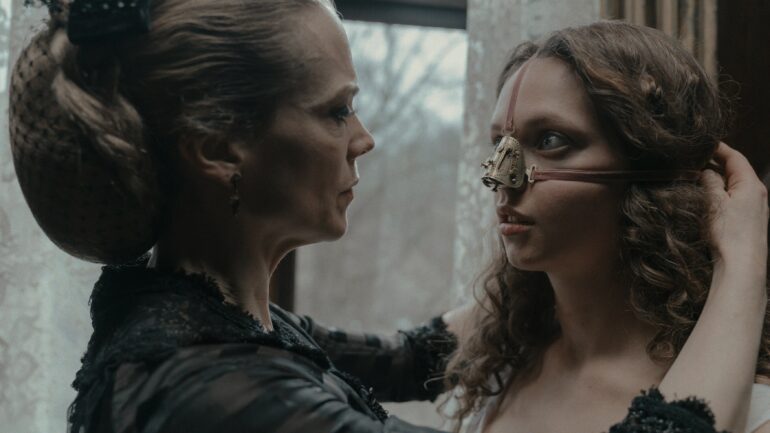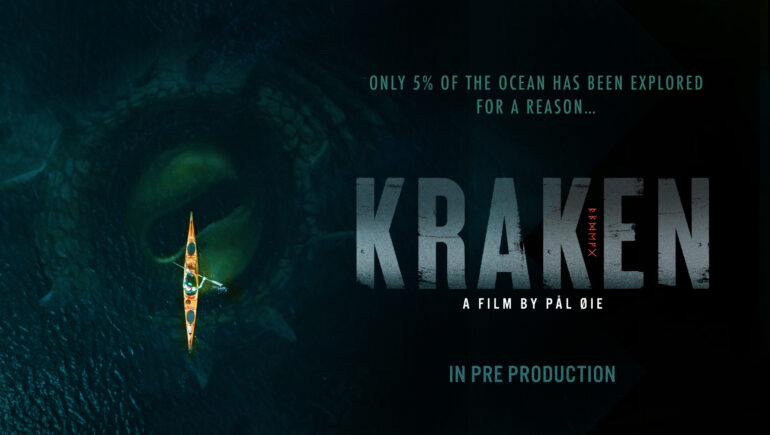Written by: Geoffrey Macnab
26.02.25
Nordic sellers reported brisk business and Nordic voices and titles were at the forefront in Berlin, where Dreams (Sex Love) became the first Norwegian film to win the Golden Bear.
When Dag Johan Haugerud’s Dreams (Drømmer) scooped the Golden Bear, it marked the culmination of a highly successful festival for the Norwegians. Kjersti Mo, director of the Norwegian Film Institute, hailed the success as “a fantastic culmination of 2024 — the best year ever for Norwegian film internationally”, and she spoke of a new “golden age in Norwegian cinema”.
Dreams (which also won a FIPRESCI Critics’ Award and a prize from the Guild of German Arthouse cinemas) wasn’t the only Nordic title recognised by audiences or juries in Berlin.
Two Norwegian films picked up European Children's Film Association Awards in Berlin: Mari Monrad Vistven’s Todd & Super-Stella, and Eirik Sæter Stordahl’s Lars is LOL (Lars er LOL).
Swedish outfit Kinana Films produced US-based filmmaker Areeb Zuaiter’s Yalla Parkour, a documentary about young men doing “parkour” in Gaza, that came second in Berlin’s Panorama Audience Award for documentary.
Home Sweet Home (Hjem kære hjem) by Danish director Frelle Petersen, won third prize in the Panorama Audience Awards.
“Historically, Berlin has an open eye toward Scandinavia,” Dreams producer Yngve Sæther of Motlys commented on the strong selection of Nordic films and series in this year’s Berlinale.
The Danes may have been distracted by the Oscars (where Magnus von Horn’s The Girl with the Needle (Pigen med nålen) will be vying for an award on Sunday), but they were still well represented on Potsdamer Platz too. Jeanette Nordahl’s second feature film Beginnings (Begyndelser) starring Trine Dyrholm and David Dencik was a world premiere in Panorama. Sold by REinvent Studios, the film is already receiving offers.
Meanwhile, another Danish title, Robin Petré’s documentary Only on Earth, a grim but spectacular chronicle of devastating wild fires in Galicia, was unveiled in Generation Kplus, and was picked up for world sales by Autlook.
Greenlandic short The Thief (Anngeerdardardor), from Christoffer Rizvanovic Stenbakken, about a stolen sledge dog, premiered in Generation Kplus.
Norwegian Emilie Blichfeldt’s The Ugly Stepsister (Den stygge stesøsteren, sold by French outfit Paradise City) premiered in Panorama prior to its release by Scanbox in Norway next month.
Also during the Berlinale (although not officially part of it), Norwegian political drama series Power Play (Makta) won the HARPA Award for its music. The awarded composers are Kåre Christoffer Vestrheim, Andréa Louise Horstad, Kristoffer Lo, and Eivind Helgerød. The series is sold by REinvent and produced by Motlys (also the producers of Dreams).
In the European Film Market, business again seemed brisk on Nordic titles. “We made the best sales for years,” commented Rilke Ennis, CEO at Copenhagen-based REinvent Studios. “It’s like somehow the wheels are beginning to spin again. There has been an appetite to start buying again…but of course you can feel the prices are not sky high.”
On certain titles, Ennis and her team have even been achieving pre-sales on the basis of cast and subject matter. “It’s a very optimistic thing for us to see pre-buys in the market, because we haven’’t for a very long time.”
International buyers were swarming around Danish director Anders Thomas Jensen’s black comedy The Last Viking (Den Sidste Viking), starring Mads Mikkelsen. Nicolai Korsgaard, sales director at TrustNordisk, reported having to shorten meetings to only 15 minutes to accommodate all the interested distributors.
Another title generating buzz in advance of its release later this year was Norwegian monster movie Kraken by Pål Øie, which also sold briskly for TrustNordisk, finding buyers in Germany (Splendid) France (Mediawan) and elsewhere across Europe.
“These ones went really well, and we sold in major territories,” Korsgaard commented.
Prominent French and German sales agents were handling Nordic titles on their EFM slates. For example, Stuttgart-based family films specialists Sola Media had Norwegian animated film A Mouse Hunt For Christmas (Hvis ingen går i fella), Paris-based Coproduction Office was doing roaring business pre-selling Swedish maverick Ruben Östlund’s airplane disaster satire The Entertainment System Is Down, and Berlin-based m-appeal was handling Haugerud’s Dreams.
Nordic titles featured prominently in the Berlinale Series Market Selects strand (showcasing projects with strong market potential.) Titles in the spotlight included Heajastallan – A Sámi Wedding, about a Sámi woman trying to use her son’s wedding to boost her social status, and Icelandic project VIGDÍS, a drama about the country’s first female president. (Both titles were sold by REinvent Studios).
Nordic industry figures were also at the heart of the festival’s most lively debates. Following the screening of 80-year-old Norwegian director Vibeke Løkkeberg’s documentary The Long Road to the Director’s Chair, in the Berlinale Forum, there was a “FERA [Federation of European Screen Directors] seminar on gender parity for women filmmakers in Europe” held during the Berlinale at the Nordic embassies - and at which it was again emphasised that only 26% of directors of European feature films are women.
Løkkeberg’s film, originally shot in 1973, looked at gender inequality and the start of the feminist movement in the film industry of the 1970s.
The director herself took part in a moderated conversation with her daughter/filmmaker Tonje Kristiansen on Breaking the 26% Glass Ceiling: Advancing Gender Parity for Women Filmmakers in Europe.
Meanwhile, leading Nordic industry figures were out in force in Berlin’s Hilton Hotel for Film i Väst’s Berlinale seminar on the future of public film funding, tied to the publication of Tomas Eskilsson’s “The Answers”, the latest (and final) in his long running saga of reports on the uncertain future of film and audiovisual policies in Europe as part of the five year-long project Public Film Funding at a Crossroads (PPFC).) During a lively discussion framed as if it was a court case, tensions between cultural and commercial approaches to national film funding were laid bare.
Among the speakers/witnesses, Swedish Film Institute CEO Anna Croneman frankly acknowledged that Swedish cinema is currently struggling. “There are many reasons for the overall decline,” she said, noting that the level of support that the Institute can offer Swedish filmmakers is “much too low…our very talented filmmakers are either making TV drama or working in other countries. The Swedish audience has lost faith in Swedish cinema for a good reason”. The challenge now is both to win that audience back and to keep the best Swedish directors working at home.
At the conclusion of the event, Danish producer Louise Vesth of Zentropa made an impassioned defence of the “art” of filmmaking in a world of automatic film funding schemes. “My testimony is given to protect films that are primarily financed based on the director’s voice, and where the purpose is to provide the tax paying population with as diverse and culturally significant a film as possible,” Vesth said.
Vesth emphasised the importance of selective public film funding to ensure risk taking and diversity - and to avoid bland, market-driven mediocrity. The Golden Bear success a few days later of Haugerud’s Dreams seemed to prove that there is indeed still a strong future for the most personal and idiosyncratic auteur-driven Nordic projects.
NFTVF has already reported on several updates from the Berlinale 2025:
Read the Good Green News: CLICK HERE.
Read about the new Location Award: CLICK HERE.
Read about the Nordic Film Days: CLICK HERE.
Read about Demos Helsinki "Future Narrative" event: CLICK HERE.
Read about the Indigenous Cinema Alliance's 10th anniversary: CLICK HERE
Read the full Nordic line up: CLICK HERE.
Read more about Dreams: CLICK HERE.
Read more about The Long Road to the Director’s Chair: CLICK HERE.


